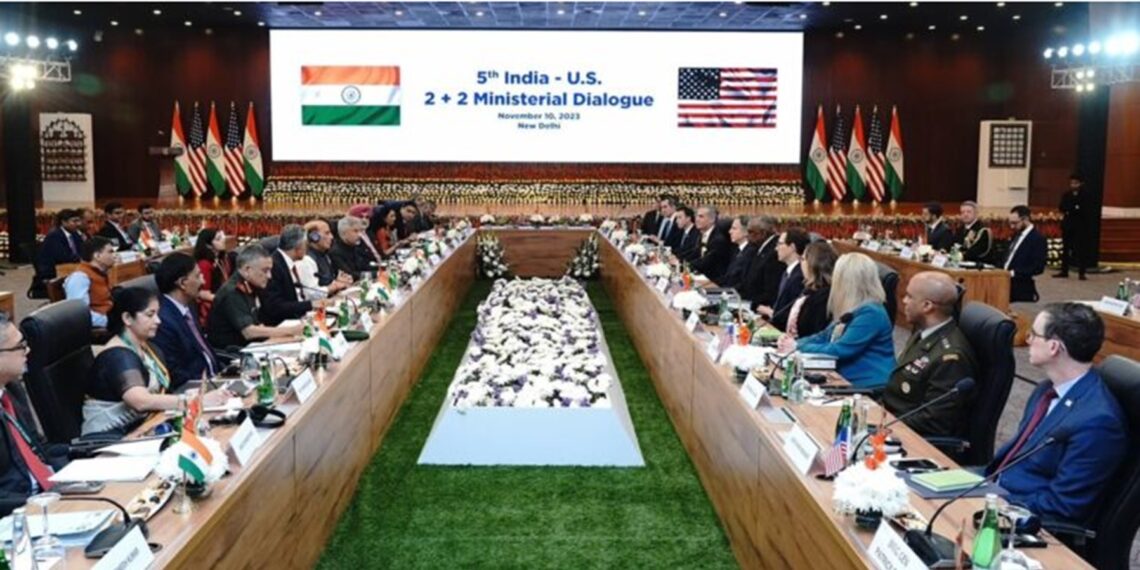For all the emphasis on India and the United States being “strategic partners”, it is now undeniable that New Delhi’s unilateral move to address its security concerns, especially in other western countries which are America’s natural allies, has caused a rupture in its ties with Washington DC.
This found expression in the manner in which the US reacted to suspected Indian attempts to “hit” Khalistani ideologues in Canada in the last six months.
The strain in India-US relations also lies exposed in the context of Bangladesh’s general elections in which both states are important stakeholders for different reasons and motivations.
Bangladesh finds itself in the midst of an intense geopolitical game in which the US seeks to halt China’s penetration in that country, while India wants to remain the unchallenged arbiter in this part of South Asia.
During the fifth annual India-US 2+2 Ministerial Dialogue in New Delhi on November 10, Indian Foreign Secretary Vinay Kwatra emphasised that Bangladesh’s politics and elections are its internal matters and that India saw no justification for an external intervention aimed at maintaining regional stability.
It was argued that India and Bangladesh share strong bonds of history, language and culture.
ALSO READ What 2+2? Now, India and China speak the same language on Bangladesh elections
In contrast, there is evidence to suggest US meddling in Bangladesh’s domestic politics.
American Ambassador to Bangladesh, Peter Haas’ many meetings with political leaders in Dhaka are clear signs of active involvement, if not interference, in that country’s political and electoral affairs.
Haas’ actions indicate a potential disregard for principles outlined in the Vienna Convention on Diplomats.
Thus, based on the statements made by the Indian foreign secretary, it can be concluded that the ministerial dialogue did not effectively address or reconcile the divergent positions held by the United States and India concerning Bangladesh’s forthcoming election. India and the US have deep-rooted and seemingly irreconcilable differences on numerous fronts, ranging from fundamental ideological disparities to stark contrasts in religious beliefs.
These fundamental divergences cast a shadow over any prospect of a meaningful partnership, suggesting that such inherent discordance may prove impossible to reconcile and hinder the potential for constructive collaboration between the two nations.
Likewise, recent reports on the US moving to thwart a plot to eliminate Sikh separatist leader Gurpatwant Singh Pannun on American soil, further exposes a deficit in mutual trust between the two countries and the deep fissures in their respective core values.
ALSO READ Hasina shares fears of US trade-related sanctions with leaders of two allied parties
American authorities have raised concerns with New Delhi that the Indian government may have had prior knowledge of the plot, but declined to comment on when or how US officials became aware of the plot as well as how the alleged assassination attempt was derailed.
The FBI is investigating the matter, a US official was quoted as saying.
“We are treating this issue with utmost seriousness, and it has been raised by the U.S. Government with the Indian Government, including at the senior-most levels. Indian counterparts expressed surprise and concern,” National Security Council spokeswoman Adrienne Watson said in a statement.
“They stated that activity of this nature was not their policy. Based on discussion with senior U.S. government officials, we understand the Indian government is further investigating this issue and will have more to say about it in the coming days. We have conveyed our expectation that anyone deemed responsible should be held accountable,” the statement added.
India’s foreign ministry issued a statement noting that the US had raised information pertaining to a “nexus between organised criminals, gun runners, terrorists and others” during recent conversations.
“During the course of recent discussions on India-US security cooperation, the US side shared some inputs pertaining to nexus between organized criminals, gun runners, terrorists and others.
The inputs are a cause of concern for both countries and they decided to take necessary follow up action,” said Arindam Bagchi, the Indian Ministry of External Affairs spokesperson.
ALSO READ Is the US poised to strike against errant Sheikh Hasina regime?
He also noted that the Americans had shared “inputs” and that New Delhi was cooperating on the matter. “Such inputs seriously since it impinges on our own national security interests as well”. “Issues in the context of US inputs are already being examined by relevant departments,” added Bagchi.
Earlier in September, Canadian Prime Minister Justin Trudeau said there were “credible allegations” pointing towards the involvement of the Government of India agents in the killing of Nijjar. India had dismissed those allegations as “biased” and “motivated”.
Both countries expelled a senior diplomat each in a tit-for-tat measure. But, India went further asking for parity in diplomatic representation, which led Canada to withdraw 41 diplomats. Additionally, India paused visa services for Canadian nationals, which were only restarted two months later.
The Indian response to the Financial Times story, admitting that “inputs” had been received from the US and were being “examined”, is in stark contrast to New Delhi’s belligerent reaction towards to Canada.
While the US had shared details of the Pannun case with “some allies” after Nijjar’s killing in June, Washington widened the circle to more countries after Trudeau went public, which “sparked concern among allies about a possible pattern of behaviour”.
The US has consistently asked India to join the Canadian investigation, with US Secretary of State Anthony Blinken having raised it last week during his visit to New Delhi. The US ambassador to Canada David Cohen had also said that information received from the ‘Five Eyes’ intelligence sharing network had contributed to Trudeau going public.
“Several people familiar with the debate inside the Biden administration said officials were aware that any public disclosure of the US plot, and Washington’s protest to New Delhi, would renew questions about India’s reliability as a trusted partner,” said the FT article.















